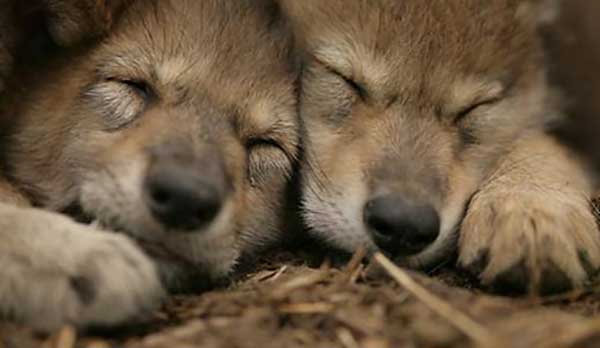Eight young Mexican wolf pups are now being cared for and raised by surrogate wild wolf parents after a successful attempt to introduce them into existing wolf litters in Arizona and New Mexico. The young wolves were placed in their foster dens by scientists from the Mexican Wolf Species Survival Plan group and Interagency Field Team (IFT), as a way to restore the rare gray wolf subspecies to its former range.
In a technique known as cross-fostering, four Mexican wolf pups were placed into wild dens in late April; two into a pack in Arizona and two into a pack in New Mexico. Last month, four more captive-born pups were cross-fostered into two wild dens; both in New Mexico. All of the pups were born at the Endangered Wolf Center in Eureka, Missouri, and fostered out at two weeks old or less.
Cross-fostering is a proven way to introduce pups into the litter of an experienced wild female to improve genetic diversity of the wild population.
“We are adaptively managing Mexican wolves in order to produce a population that is not measured by numbers alone, but by genetic robustness, desirable wild behavior and survivability,” said Amy Lueders, the U.S. Fish and Wildlife Service’s Southwest Regional Director. “Cross-fostering is just one of the management tools we use to improve the genetic health of the wild population.”
“The Arizona Game and Fish Department, U.S. Fish and Wildlife Service and our dedicated partners have been at the forefront of Mexican wolf conservation for 20 years,” said Jim deVos, assistant director of wildlife management for AZGFD. “The use of cross-fostering is proving to be a very success method to introduce new genetics into the wild population, which is key to recovery. While much work still must be done for this endangered subspecies, providing eight genetically important pups to the wild is huge progress toward genetic management and eventually recovery.”
“Now that we’ve placed the pups in the den, we will continue to remotely monitor the packs through GPS locations and radio telemetry signals to avoid further disturbance,” said John Oakleaf, Field Projects Coordinator for the Service. “Later, through remote camera observations and efforts to trap the young of the year, we hope to document the survival of the cross-fostered pups.”
Partners in the effort to recover Mexican wolves include the Service and its partners in Mexico, the Arizona Game and Fish Department, White Mountain Apache Tribe, U.S. Forest Service, USDA’s Animal and Plant Health Inspection Service –Wildlife Services, participating counties and the members of the Mexican Wolf Species Survival Plan.









